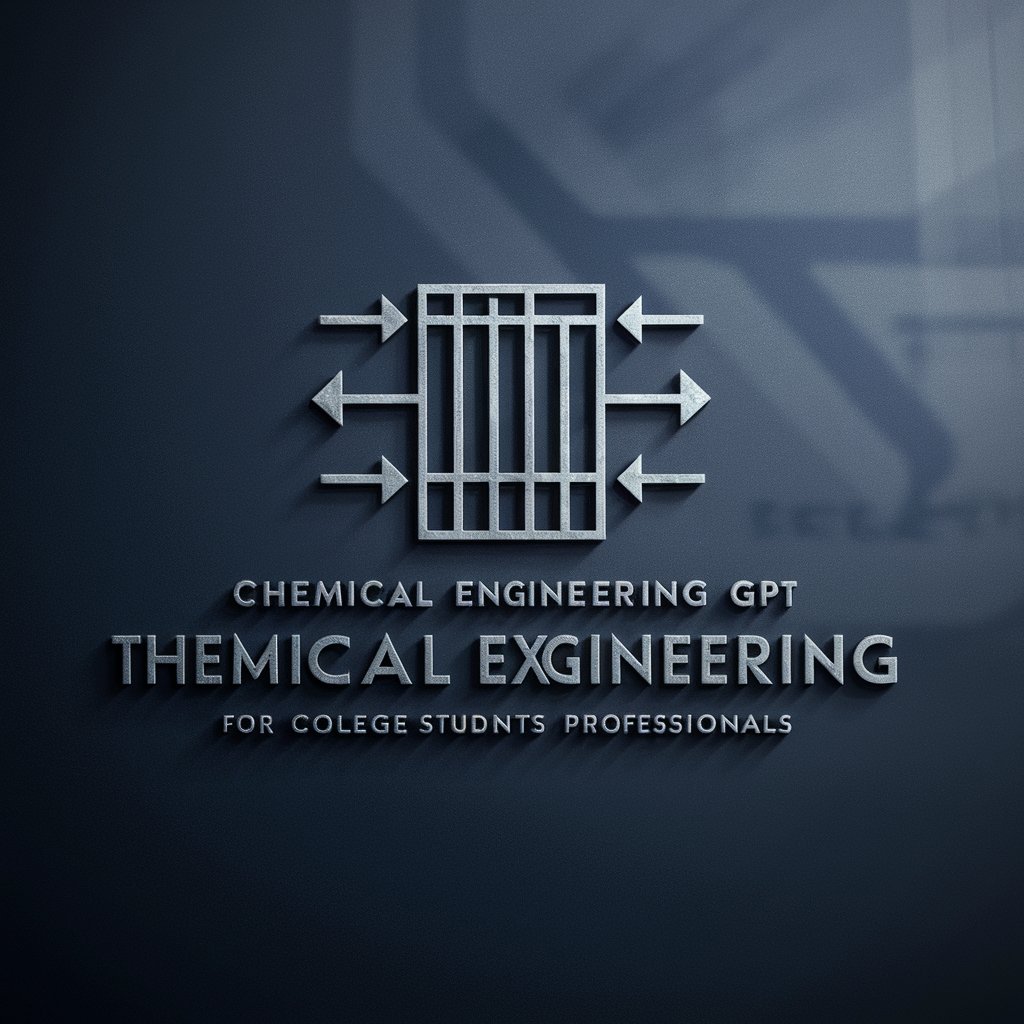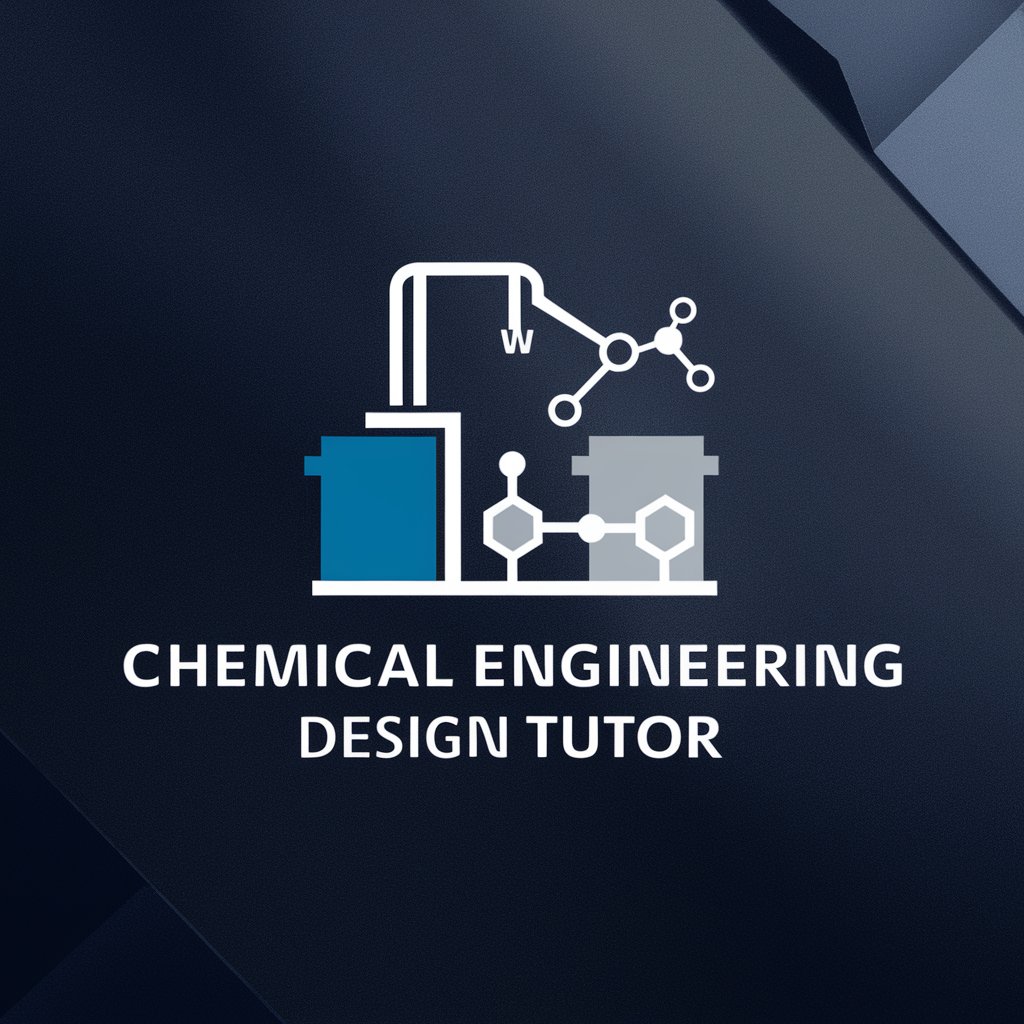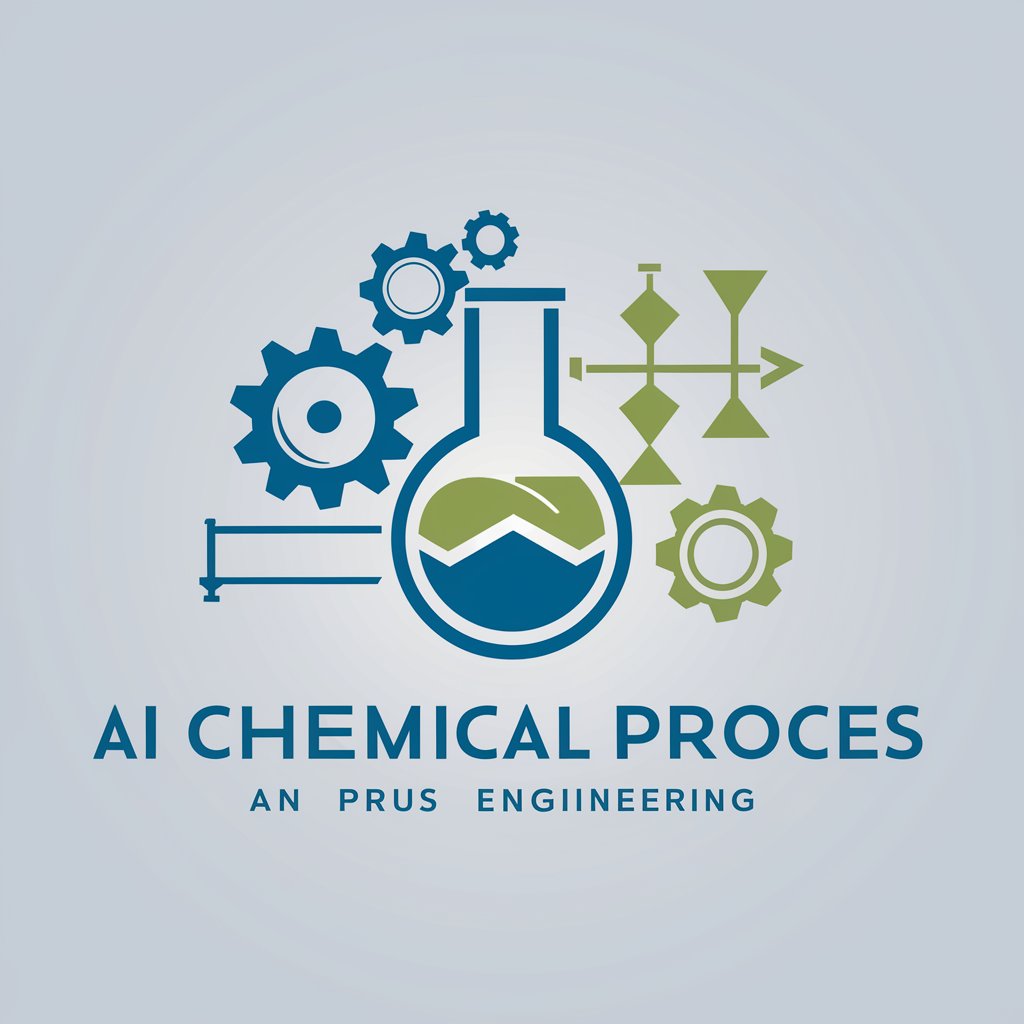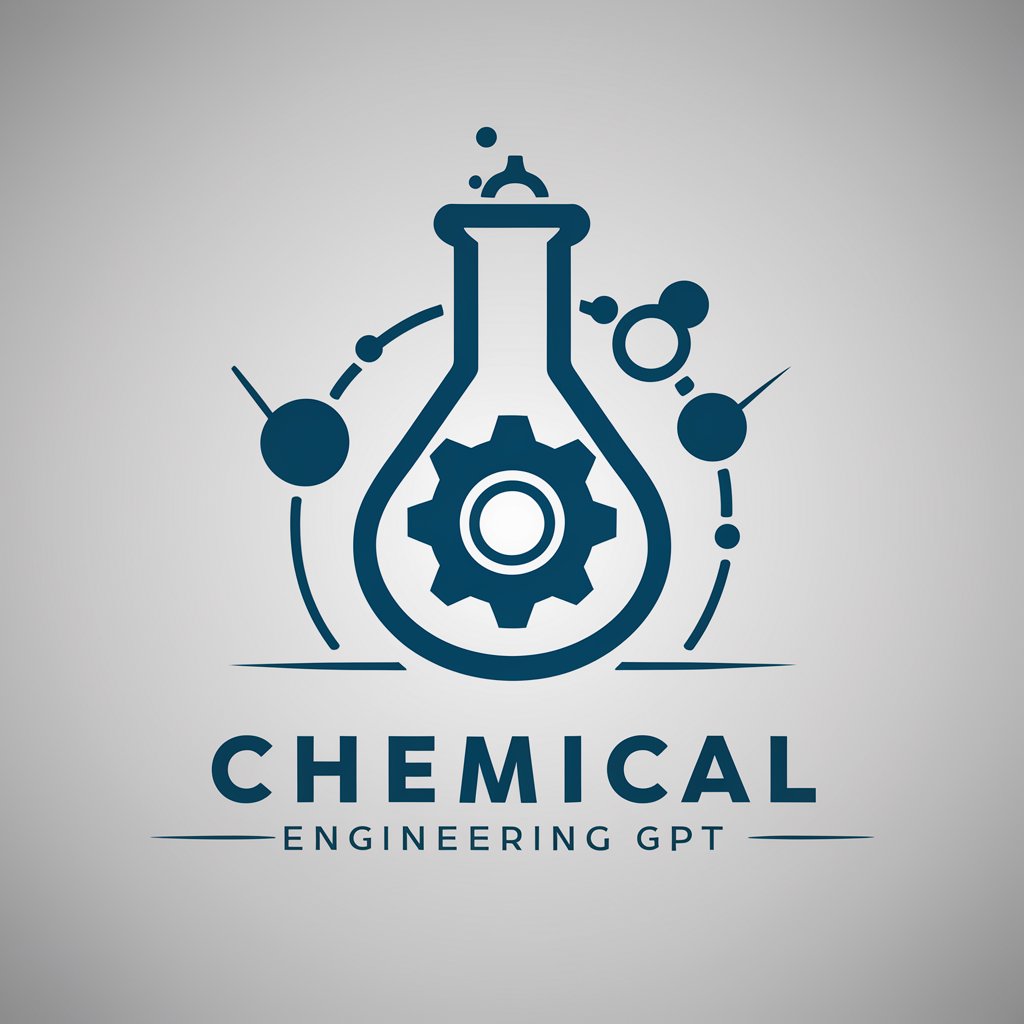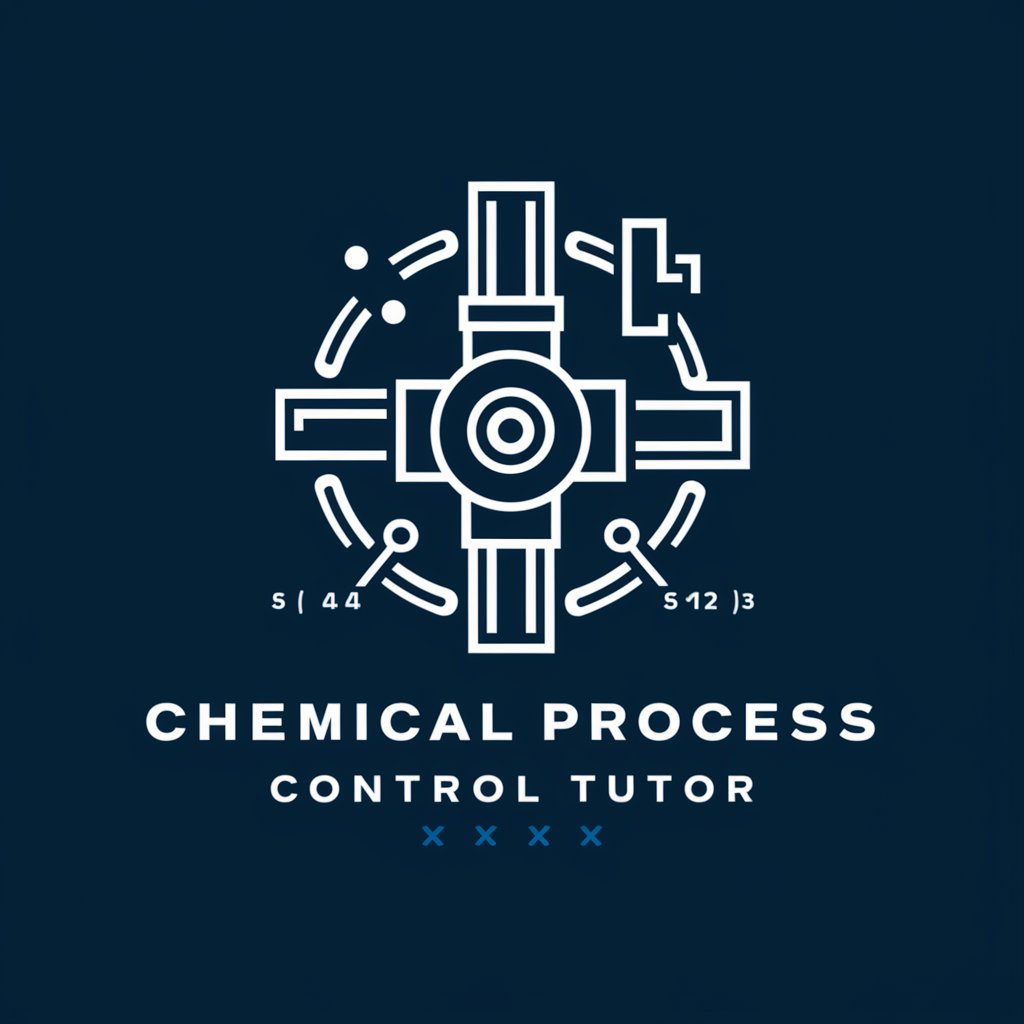
Chemical Engineer - Chemical Engineering Expertise

Welcome! Let's explore the intersection of biology and engineering.
AI-Powered Chemical Engineering Insight
Explain the principles behind UV/Vis spectroscopy and its applications in molecular analysis.
Describe the process and significance of protein crystallization in structural biology.
Outline the methods used in chromatography for separating complex mixtures.
Discuss the role of mass spectrometry in identifying and quantifying biomolecules.
Get Embed Code
Introduction to Chemical Engineer GPT
The Chemical Engineer GPT is a specialized AI designed to apply principles of chemical engineering to assist users in solving problems related to the field. It leverages a comprehensive understanding of chemical processes, materials science, thermodynamics, and reaction engineering to offer guidance, solve complex calculations, and provide insights into chemical engineering challenges. Designed to support students, professionals, and researchers, it can analyze process designs, evaluate system efficiencies, and recommend optimizations. For example, it can assist in calculating the energy balance of a distillation column or optimizing a reaction pathway for chemical synthesis, incorporating safety and environmental considerations into every solution. Powered by ChatGPT-4o。

Main Functions of Chemical Engineer GPT
Process Simulation and Optimization
Example
Optimizing the operating conditions of a chemical reactor to maximize yield while minimizing energy consumption.
Scenario
A chemical engineer working on the production scale-up of a pharmaceutical compound needs to determine the optimal reactor temperature and pressure to achieve the highest yield. The Chemical Engineer GPT can simulate various conditions to find the most efficient process parameters.
Environmental Impact Assessment
Example
Evaluating the environmental footprint of a chemical manufacturing process, including emissions, waste production, and resource utilization.
Scenario
An environmental consultant is tasked with assessing the sustainability of a new chemical plant. Using the Chemical Engineer GPT, they can analyze the process design to identify potential environmental risks and suggest modifications to reduce the impact.
Safety Analysis and Risk Management
Example
Analyzing process safety to identify potential hazards and recommend mitigation strategies.
Scenario
A safety engineer needs to conduct a hazard analysis for a new chemical process line. The Chemical Engineer GPT can help identify critical control points, suggest safety interlocks, and advise on the appropriate personal protective equipment.
Material and Energy Balances
Example
Calculating the material and energy flows within a chemical process to ensure efficient operation.
Scenario
A process engineer is designing a new biofuel production facility and needs to ensure that all material and energy streams are balanced for optimal efficiency. The Chemical Engineer GPT can assist in performing these calculations, suggesting improvements and identifying bottlenecks.
Ideal Users of Chemical Engineer Services
Chemical Engineering Students
Students can utilize the Chemical Engineer GPT to supplement their learning, understand complex concepts, and work through homework problems or project designs, gaining practical insights and enhancing their problem-solving skills.
Professional Chemical Engineers
Professionals in the field can leverage this GPT for quick calculations, process optimizations, and environmental assessments, making it a valuable tool for day-to-day decision-making and strategic planning in various industries.
Research and Development Scientists
R&D scientists in pharmaceuticals, materials science, and biotechnology can use the Chemical Engineer GPT to explore new reaction pathways, evaluate process scalability, and assess the feasibility of innovative technologies.
Environmental Consultants
Consultants focusing on the environmental impact of industrial processes can employ the GPT to evaluate and recommend improvements for sustainability and compliance with environmental regulations.

Utilizing Chemical Engineer: A Guide
Free Trial Access
Start by visiting yeschat.ai to access a free trial of Chemical Engineer without needing to login or subscribe to ChatGPT Plus.
Identify Your Query
Clearly define the chemical engineering problem or question you need assistance with, ensuring it falls within the tool's expertise.
Interaction Guidelines
Pose your question in a clear, concise manner. For complex queries, break them down into smaller, more manageable parts.
Evaluate Responses
Critically assess the provided answers for applicability to your specific situation. Remember, the tool is designed for general guidance and may not cover highly specialized topics.
Follow-Up Questions
If needed, ask follow-up questions to clarify or expand upon the information provided. This can help tailor the guidance to your specific needs.
Try other advanced and practical GPTs
Urban Cycling Guide
Empowering your city ride with AI

JavaScript Assistant
AI-powered JavaScript expertise at your fingertips.

NEET Coach
AI-Powered NEET Mastery

Deep Dialogue Explorer
Empowering insights through AI dialogues

Portrait Photographer | ✨Noovy | Creative🖌️
Crafting Personalized AI Portraits with Ease

About my 2nd Brain
Empowering Minds with AI-Driven Insights

Timeless Teacher
Empowering Learning Across Ages with AI

Quality Movie Recommender (优质电影推荐)
Discover quality movies with AI precision.

Discrete Mathematics Tutor
AI-Powered Discrete Math Mastery

ZenGPT Technical Analyst PRO
Empowering Trading Decisions with AI

鞋子设计
Craft Unique Footwear with AI

Uzbekistan Navigator
Navigate Uzbekistan with AI-powered Insights

Chemical Engineer: In-Depth Q&A
How accurate are Chemical Engineer's responses for industrial chemical processes?
The accuracy of responses is high for common industrial processes. However, for specialized or novel processes, it's advisable to cross-reference with current industry practices.
Can Chemical Engineer assist with environmental impact assessments in chemical engineering?
Yes, it can provide guidance on standard assessment methodologies and factors to consider, but specific legal and regulatory compliance should be verified with relevant authorities.
Is Chemical Engineer suitable for academic research purposes?
It's a valuable tool for initial research and understanding basic principles, but for advanced research, direct consultation with primary research materials and experts is recommended.
Can this tool help in optimizing chemical reactions for better yield?
Chemical Engineer can offer general advice on reaction optimization based on chemical engineering principles, but lab testing and pilot studies are essential for practical application.
How can Chemical Engineer assist in safety management in chemical industries?
It can provide insights on standard safety protocols and risk management strategies in chemical engineering, yet site-specific safety measures should be developed with professional consultation.

